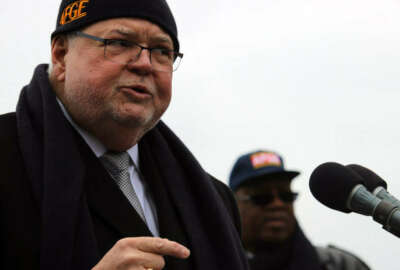
USS John S. McCain back at sea after 2017 collision
In today's Federal Newscast, a long series of repairs and upgrades, the Japan-based destroyer now undergoing a series of at-sea tests and training.
To listen to the Federal Newscast on your phone or mobile device, subscribe in PodcastOne or Apple Podcasts. The best listening experience on desktop can be found using Chrome, Firefox or Safari.
- The USS John S. McCain is back at sea two years after it was badly damaged in a collision near Singapore. The Japan-based destroyer has finished a long series of repairs and upgrades, and it’s now undergoing a series of at-sea tests and training, according to the Navy. Ten sailors were killed when the ship ran into an oil tanker in August 2017. It was one of two deadly collisions that helped prompt a series of Navy reviews on training and readiness. Last year, the ship’s commanding officer and a senior enlisted sailor pleaded guilty to court martial charges of dereliction of duty. (Navy)
- The Federal Retirement Thrift Investment Board is reconsidering planned changes to its international fund. The TSP was planning to move it to a new benchmark that included emerging and Chinese markets in mid-2020. But a bipartisan group of senators say the upcoming change exposes federal retirement assets to too much risk in the Chinese markets. The TSP agency asked an independent consultant to review its initial recommendation on the I Fund. The company says moving to the new benchmark may improve participants’ returns and would put the TSP in line with other peer 401K plans. (Federal News Network)
- FRTIB is seeing a dramatic increase in interest in the new withdrawal options it unveiled last month. In-service withdrawals were up nearly 400% last month compared to the previous September. TSP participants who have left federal service are also taking significantly more distribution withdrawals. The TSP processed over 13,000 withdrawals in September, compared to 2,600 withdrawals last year. The TSP says more participants are making more individual withdrawals, but they’re taking less money out of their accounts. (Federal News Network)
- The national president of the largest federal employee union has taken a leave of absence amid sexual harassment allegations from current and former staffers. J. David Cox, says he’ll temporarily step aside while the American Federation of Government Employees conducts an investigation into potentially inappropriate comments and behavior. Cox denied the allegations. AFGE National Secretary Treasurer Everett Kelley will perform the duties of the national president while Cox is gone. Cox says, he didn’t want the investigation to be a distraction from the union’s ongoing work. (Federal News Network)
- The White House’s network security efforts have come under scrutiny from Capitol Hill. Congressman Ted Lieu (D-CA) wants answers from the White House about how its ensuring its network and data are protected. The California Democrat wrote to acting White House Chief of Staff Mick Mulvaney after Axios reported at least 12 senior cybersecurity employees left over the past months putting the networks and data at greater risk. Lieu asks Mulvaney to respond to five questions including what immediate steps he’s taking to staff the chief information security officer’s office and why have White House cybersecurity responsibilities been delegated to the Office of the Chief Information Officer, which is not covered under the Presidential Records Act. (Rep. Ted Lieu)
- Derek Tournear has been named the first permanent director of the Space Development Agency. The agency is responsible for unifying and integrating the Pentagon’s space acquisition efforts. It also monitors DoD’s threat-driven space architecture and helps develop new space capabilities. Tournear previously served as DoD’s assistant director for space. He also spent time as a program manager at the Defense Advanced Projects Research Agency. (Department of Defense)
- The Army is assessing some of its historic housing in the wake of reports of mold, mice and lead paint in some privatized military housing. It will address 2,700 houses built between 1919 and 1940 instead of assessing them individually. The plan is to decide what management actions need to be taken on the houses. Those include renovation, repair, maintenance, abatement or demolition. (Army)
- The General Services Administration is seeking feedback from industry on best practices for buying human-centered designed services for the federal government. GSA will gather input from its request for information, and use it to inform part of a federal buying guide it’s putting together. The agency’s Office of Customer Experience has also conducted a study of current customer experience and design practices that’ll help shape the buying guide. (General Services Administration)
- Two agencies are trying to relieve the burden of False Claim Act allegations on lenders. The departments of Justice and Housing and Urban Development signed a Memorandum of Understanding creating new guidance on the appropriate use of the False Claims Act for violations by Federal Housing Administration lenders. DOJ and HUD will work together to determine when HUD’s administrative remedies are sufficient and when U.S. attorneys need a more punitive remedy. HUD and Justice say the MOU is intended to address concerns that uncertain and unanticipated False Claims Act allegations have forced many banks and credit to largely withdraw from FHA lending. (Department of Justice)
- DOJ has announced a pilot program which will allow federally deputized task force officers to use body-worn cameras. The agency said several state and local law enforcement agencies requested their officers be allowed to wear body cameras when participating on federal task forces, and use of force is possible. (Department of Justice)
- After an overwhelming response, the National Park Service has walked back its plan to charge fees for demonstrators looking to protest on the National Mall. The agency received more than 140,000 comments largely against the proposed rule. Park service officials said the rule was meant to balance people’s right to protest with other visitors, with visitors and tourist wanting to enjoy the space. (National Park Service)
- The White House welcomed a new class of White House Fellows. Fifteen people from a variety of backgrounds make up the this year’s class. The Fellows work for a year in public service at full-time pay. Several have military and law enforcement backgrounds, such as Brandon Dues from Kentucky, who 299 Special Operations combat missions. Fellows also include doctors, technology experts and educators. They’ve been assigned to VA, Energy, Ex-Im Bank, State, Overseas Private Investment Corporation, Defense, HHS, Education, HUD, and various White House slots. (White House)
Copyright © 2024 Federal News Network. All rights reserved. This website is not intended for users located within the European Economic Area.
Eric White
Eric White is news anchor and Federal Drive producer at Federal News Network.
Follow @FEDERALNEWSCAST
Related Stories
Related Topics
All News
Defense
Defense News
Department of Housing and Urban Development
Derek Tournear
Everett Kelley
False Claim Act
False Claims Act
Federal Drive
Federal Newscast
Federal Retirement Thrift Investment Board
General Services Administration
J. David Cox
Justice Department
Mick Mulvaney
National Park Service
Navy
Space Development Agency
Ted Lieu
USS John McCain




